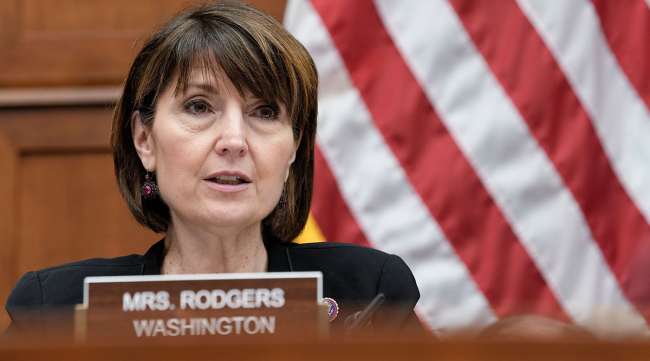Senior Reporter
House Policymakers Eye Supply Chain Reforms

[Stay on top of transportation news: Get TTNews in your inbox.]
Ensuring the safety and efficiency of the nation’s supply chain is an ongoing priority for key policymakers in the U.S. House of Representatives.
As congressional leaders prepare to consider comprehensive supply chain legislation, Energy and Commerce Committee Chairwoman Cathy McMorris Rodgers (R-Wash.) pointed to existing projects and programs that could benefit from legislative attention. She emphasized the adoption of emerging technology as a strategy for safeguarding supply chain connectivity.
“If we fail to adequately secure our supply chains, the technologies we rely on every day will be vulnerable to malicious actors and adversaries like China who want to use these technologies to exploit and surveil Americans and their families,” McMorris Rodgers said Sept. 20.
“We’re seeing how interested China is in testing their self-drive technologies on American roads,” she continued. “We must ensure the technologies of tomorrow are developed in an ecosystem that promotes America’s values and protects American data and our privacy.”

Bilirakis
Senior Republicans on the panel are examining the pandemic’s impact on supply chains as well as considering resources designed to monitor safety across freight corridors. Rep. Gus Bilirakis (R-Fla.), a senior member of the Energy and Commerce Committee, explained he is focused on efforts meant to “provide a stable regulatory framework that rewards innovators and entrepreneurs with results.”
“To secure our future, we need to address problems our nation faces at the root cause,” he said. “That means mapping and monitoring supply chains and understanding why we are so reliant on adversaries like China for many critical minerals and components, essential for products our constituents use. We should understand how we can source in America or with allied nations.”
“It means promoting the deployment of emerging technologies like blockchains to have greater transparency into a chain of custody or autonomous vehicles to help deliver goods where we see voids,” Bilirakis continued.
A bill backed by the committee’s leaders would establish a supply chain resiliency program within the Department of Commerce. Sponsored by Rep. Larry Bucshon (R-Ind.), the legislation would “encourage the development and competitiveness of U.S. productive capacities and manufacturing in the U.S.,” per background the committee provided. The GOP-backed measure also “would designate the secretary of commerce as the principal adviser to the president of the U.S. for policy pertaining to the deployment, use, application and competitiveness of blockchain and other distributed ledger technologies.”
Democrats on the committee, led by Rep. Frank Pallone (D-N.J.), have proposed legislation as well. Their Supply CHAINS Act would establish standards for companies to identify and address supply chain vulnerabilities.

Pallone
“The supply chain crisis may no longer be front page news, but serious supply chain vulnerabilities persist. The Biden administration’s 100-day supply chain review found that manufacturing supply chains instrumental to our national security and economic welfare remain vulnerable to disruption, strain, compromise and elimination. These vulnerabilities are industrywide and affect every American,” Pallone observed. “The Department of Defense warns that the decline in domestic manufacturing capability could result in a growing and permanent national security deficit that presents challenges to our military and technological supremacy.”
“Over the last few years, we’ve seen the devastating consequences of the weaknesses in our supply chains, especially for the people of Michigan, many of whom are auto workers and manufacturers,” Rep. Debbie Dingell (D-Mich.), a bill sponsor, said earlier this year. “This comprehensive set of legislation will bring our supply chains home and prevent future vulnerabilities, reducing our dependence on our foreign competitors, investing in American jobs, and strengthening our national and economic security.”
Republican leaders have yet to schedule a floor vote on the panel’s measures related to the supply chain.
Want more news? Listen to today's daily briefing below or go here for more info:




